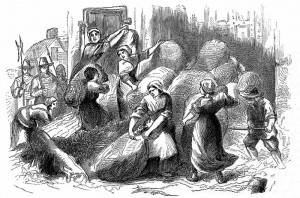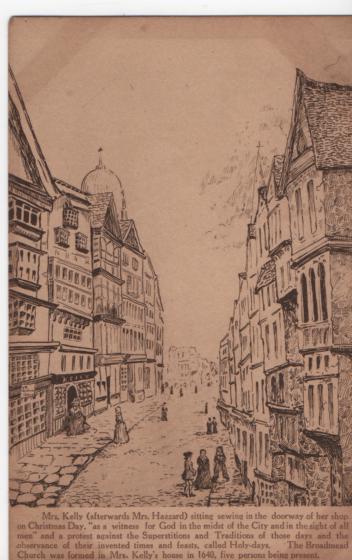Taken from Bristol Past and Present by J. F. Nicholls and John Taylor, published in 1882
In Bristol from 1604 the Rev. William Yeamans, a Puritan vicar of the church of St. Philip and Jacob, was the central rallying point for the godly, who sat under his light for nearly twenty years, keeping many fast days in private houses, namely, at one Wm. Listun’s house, a glover, near Lawford‚s gate, and at one Richard Langford’s house, a house carpenter in the Castle, and sometimes at other places, where they did cry day and night to the Lord to pluck down the lordly prelates of the time, and the superstition thereof.” They also met at Anthony Kelly’s, grocer, in High street, at Robert Haynes‚, writing schoolmaster, in Corn street, at Richard Moon‚s, farrier, in Wine street, and at Goodman Coles‚, victualler or butcher, at Lawford‚s gate. Mr. Kelly died in 1631; Mr. Yeamans in 1633, after which from time to time Puritan clergymen, chiefly from South Wales, came occasionally to minister to the bereaved flock. Eventually, Mr. Hazard, “a young preacher who savoured of the Puritanic spirit,” came to St. Nicholas on a temporary visit, and as a supply preached at Redcliff, but had to leave there because he used too much plainness of speech. This would appear to have been in 1639, at which period the widow Kelly kept on the grocer‚s shop between the Guilder‚s inn and the High Cross, “where she would keep open her shop on the time they called Christmas Day, and sit sewing in her shop, as a witness for God in the midst of the city, in the face of the sun, and in the sight of all men … when as it were all sorts of people had a reverence of that particular day above all others… She was the first woman in this city of Bristol that practiced that truth of the Lord which was then hated and odious, namely, Separation.” (This is the same strong-minded lady who, with Mistress Joan Batten and others, stopped up the Frome gate with woolsacks and earth to keep out Prince Rupert, in 1643, for particulars of which see Vol. I. 310.) Meetings were then resumed in private houses, and it was the practice of the godly people to meet at each other‚s houses for devotional exercises, “to compare notes of the sermons,” and because there were many women of the company, the basest insinuations were circulated about these gatherings. Mrs. Kelly‚s house was attacked on at least one occasion, and all the windows broken by “a rude mob of the rabble and sailors,” because “they heard there was a conventicle of Puritans, which was to them a very strange and un-heard of thing, for people to meet in a church with a chimney in it.” The injured party complained to the mayor, and sought for redress and punishment of the ringleaders, but the magistrate, instead of doing them justice, threw some of them into prison. This led to a petition to Parliament of complaint against the mayor, which William Listun went to London and presented. The Houses “graciously favoured the cause of the godly, and well resented their case in Bristol,” which startled the mayor, and abated his persecuting spirit. When Listun returned from London, it was noised abroad that he too would be imprisoned, and more severely dealt with than others had been, and he was advised to keep quiet. But strong in the justice of his cause, he went the next day to the shop of his friend Haynes, opposite to the Tolzey; the mayor, on seeing him there, sent a sergeant to ask him to come over and speak to him, when, instead of sending him to prison, his worship asked him what he did in London, and being told, he civilly dismissed him.

Unable to conform to the ceremonies of the establishment, the sectaries also hired houses in other parishes if there was therein a Puritan preacher — the law being very strict as to their attendance on the church of the parish in which they resided – returning on the Monday to their shops and places of business. When Mr. Hazard was driven from Redcliff, the people persuaded the widow Kelly to marry him, which she did. Soon afterwards, on hearing the clergyman of her parish (All Saints) state in a sermon “that pictures and images might be used in churches”, she rose and left the church in the midst of the sermon, nor ever would enter it again, for which conduct, and for having previously refused to kneel at the sacrament, she was about to be brought into the spiritual court, to avoid which she and her young husband had just stepped out of their door to go and hire a house in another parish, when at this juncture “a woman came to them in the street and told them the minister of St. Ewen‚s parish was deceased, and that the people of the parish had chosen him (Hazard) to be their minister”. In the parsonage, which they only used themselves on the Lord’s day, the Hazards entertained sometimes two or three families at one time (who were expatriating themselves for conscience sake to New England), whilst they waited in Bristol for a ship or for a fair wind. At other times the parsonage became a lying in hospital for good women, who objected to the “ceremonies of their churching, the cross, and other impositions, that most of the parsons of other parishes did burden them withal that were delivered within their precincts”. Mr. Hazard, by virtue of his office, was compelled to use the prayers of the church, although he would not in- discriminately administer the sacrament. Then arose a conflict in Mrs. Hazard’s mind as to her duty. Her wifely affection and her position as a clergyman’s wife drew her one way; her conscientious dislike of forms acted powerfully in an opposite direction. On her way to church one morning she hesitated and made a final appeal to her Bible; it opened at Rev. xiv. 9—11, “If any man worship the beast,” &c. This was decisive; she from that moment became a Separatist. Four others, holding similar views, joined her: these were- Atkins, a countryman of Stapleton; Cole, butcher; Moon, farrier; and Mr. Bacon, a, young minister, This was in the year 1640, and these five laid the foundation of open Dissent in Bristol. They met in the Parsonage house, and “covenanted to worship the Lord purely and persevere therein to their end.” Their custom was in the morning of the Lord’s-day to have their own devotional exercise until the prayers in the church were ended, and then to enter and listen to Mr. Hazard’s sermon. In the afternoons they met to strengthen each other in the faith, at fist at Mr. Hazard‚s, subsequently at Mr. Bacon‚s house in Lewin’s mead. At Easter, Mr. Hazard, who was a man of very tender conscience, left the city, in order to avoid being compelled by law to administer the Sacrament to all comers being parishioners; at which juncture Mr. Cann, a Baptist, who had issued a Bible with notes and references, came to Bristol. Mrs. Hazard fetched him from the “Dolphin” inn, where he preached in the large room, to her own house, where she entertained him during his stay in the city. The next Lord‚s—day he preached in the church at Westerleigh, where many of the professors went from Bristol to hear him; but a godly great woman of that place, hearing that he was a Baptist, caused the church to be closed against him in the afternoon, although the vicar, Mr. Fowler, was rather favourable to him. Mr. Cann, therefore, held a service of two hours upon the green, and stated that if the churches were closed against him he should in future hire a barn, or any convenient building for the purpose of worship.
The idea of preaching in an unconsecrated place found no favour in the sight of the people, as we may well imagine, and for two years the Separatists continued worshipping as they best could in each other‚s houses. They lost Mr. Bacon, who accepted a call to the church at Filton; the little handful of believers, however, prospered under lay agency until, in 1642, a Mr. Pennill, who had been the vicar of St. Leonard’s, became a Nonconformist, and took the oversight of them in the Lord. By this time, with accessions from Brislington, Keynsham and Wells, &C., they numbered in church fellowship 160 persons. Then broke out the war between the king and Parliament, and the opprobrious name of Roundhead was applied to the Puritans, chiefly because the apprentices, who in large numbers entered the army, cut their hair short, so that their ears could be seen. The city being, in 1642—3, in the possession of the Parliament, many Welsh christian people sought refuge therein; and Mr. Cradock, who was pastor of the church at Llanvaches, being with many of his people refugees, the two churches, Welsh and English, coalesced, and met in fellowship in the great room of the “Dolphin ” inn. This was the first place in Bristol in which the ordinance of the Lord’s Supper was administered to a Dissenting church. They afterwards met for worship at a baker‚s house on St. James’ back, and finally in the church of St. Ewen, until Bristol was taken by Prince Rupert, when they again met secretly in private dwellings, principally at Mrs. Nethway’s, a brewer’s house in Lewin’s mead; but on the Lord’s-day in the morning they attended the church of All Saints, where Mr. (afterwards Doctor) Ingelo was appointed the minister. This continued for four or five years, when Mr. Ingelo’s dress and musical tastes gave offence to the more rigid. Mrs. Nethway having heard a good report of Mr. Thomas Ewins, late of All Hallows, London, but then a preacher at Llanvaches, rode over into Wales to hear him ;the result being that Mr. Ewins was, on the 14th July, 1651, invited by the commis- sioners under the Act of Parliament passed “for the better maintenance of ministers to preach the gospel,” as well as by the members of the church, to come to Bristol. The commissioners who signed the invitation mere ten in number. [The first commissioner was Desnnis Hollister, who was a member of the Parliament of 1653 ;four others, viz., H. Browne, R. Aldworth and E. Tyson, who was mayor in 1659—60, with R. Vickris, who had been chief magistrate ; two others, Thomas Harris and George Lane, served also as sheriffs; the other three were James Powell, John Haggatt and Jer. Holwey.]
Most modern preachers would shrink from the work performed by Mr. Ewins. Teacher of the church which had given him the call, “he was also appointed by the mayor to be lecturer for the city. Every Tuesday he had to preach a sermon at St. Nicholas ; on the Lord‚s- day morning at Christ church ;at St. Mary-le-port in the afternoon; and in the summer he frequently preached as well in the evening at St. Thomas’, over the bridge, and at St. Philip‚s, because these churches were more spacious.” He also preached once a fortnight at the almshouses of St. Michael‚s hill (Foster‚s) and at Lawford‚s gate, lectured at Bedminster and other places on convenient seasons, and during the long winter evenings he gave expositions and lectures at St. Ewen’s and St. Leonard’s. Under the Commonwealth the practice appears at first to have been for the Dissenters to have what is termed a mixed communion, pedo-Baptists and Baptists worshipping God in fellowship and brotherly unity; but in 1650—1, or thereabouts, some of the brethren who could not countenance “the sprinkling of infants” separated themselves from the congregation, and under Mr. Hynam founded what is best known as the Pithay Baptist church.
